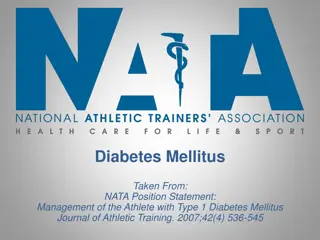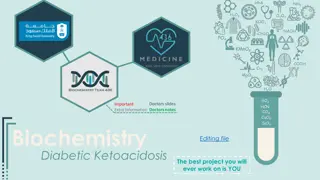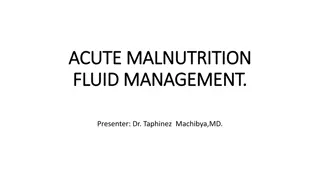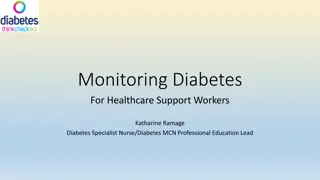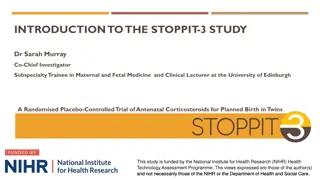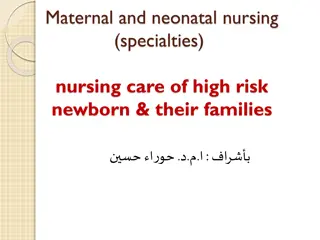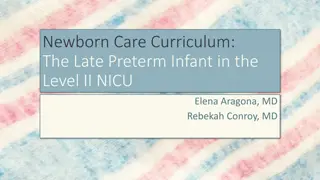Nursing Management of Diabetes in the Elderly
Providing specialized care for elderly patients with diabetes is crucial due to the increased risk of hypoglycemia. Understanding the definitions, classifications, and implications of diabetes in this population helps healthcare professionals develop effective treatment strategies and mitigate poten
2 views • 22 slides
Simulation-Based Training for Diabetes Care in Nursing
This simulation program, SCENS, focuses on enhancing nursing skills in managing diabetes-related complications such as hyper/hypoglycemia. The learning objectives include assessment, safe care provision, insulin administration, and effective communication. The simulation addresses the significant im
0 views • 17 slides
Diabetes Mellitus Type 1 Management Guidelines for Athletes
Diabetes Mellitus Type 1 is a chronic endocrine disorder characterized by hyperglycemia, absolute insulin deficiency, and autoimmune origins. This condition, more common among athletes, requires careful monitoring, insulin therapy, blood glucose management during exercise, and recognition of hypogly
0 views • 7 slides
Understanding Diabetic Emergencies: DKA, HHS, Hypoglycemia
This lecture focuses on diabetic emergencies such as Diabetic Ketoacidosis (DKA), Hyperosmolar Hyperglycemic State (HHS), and Hypoglycemia. It discusses the definitions, causes, mechanisms, manifestations, and management of these critical conditions. By the end of the session, students will have a c
0 views • 40 slides
Acute Malnutrition - Fluid Management and Treatment Overview
Acute malnutrition, particularly severe acute malnutrition (SAM), requires careful fluid management and a structured treatment approach involving stabilization, transition, and rehabilitation phases. This condition results from inadequate dietary intake or acute infections, leading to severe wasting
0 views • 23 slides
Management of Hypoglycemic Disorders: Evaluation and Guidelines
Hypoglycemia can present with various etiologies, including insulinoma, NIPHS, and antibody-related disorders. Diagnosis relies on clinical evaluation and specialized tests. Treatment may involve partial pancreatectomy or exclusion of surreptitious causes. Guidelines emphasize the importance of thor
0 views • 21 slides
Pediatric Diabetic Ketoacidosis: Diagnosis, Management, and Case Studies
Management of pediatric diabetic ketoacidosis (DKA) is crucial to prevent complications such as cerebral edema and hypoglycemia. This content covers the incidence of DKA in children, traditional aims of DKA management, guidance from BSPED, and case studies for practical application. Learn to diagnos
0 views • 38 slides
Managing Diabetes: Importance, Recognition, and Treatment of Hypoglycemia
Proper management of diabetes is crucial to prevent complications such as physical disabilities, infections, and hospital admissions. Recognizing and treating hypoglycemia, a common side effect of diabetes medications, is essential to avoid serious consequences. Risk factors, signs, symptoms, and po
0 views • 28 slides
A Randomised Trial of Antenatal Corticosteroids in Twins
Dr. Sarah Murray leads the STOPPIT-3 study, assessing the use of antenatal corticosteroids in twins for planned births to reduce respiratory morbidity. The trial aims to address the lack of evidence in this area, with potential benefits in reducing neonatal unit admissions but also risks such as neo
0 views • 14 slides
High-Risk Newborn Nursing Care and Factors
Maternal and neonatal nursing specialties focus on providing care for high-risk newborns and their families, who face conditions endangering the neonate's survival. Factors contributing to high-risk newborns include high-risk pregnancies, maternal medical illnesses like diabetes, labor complications
0 views • 25 slides
Newborn Care Curriculum for Late Preterm Infants in Level II NICU
This curriculum module focuses on the care of late preterm infants in Level II NICU settings, covering topics such as respiratory management, feeding difficulties, hypoglycemia, hypothermia, sepsis, hyperbilirubinemia, and discharge planning. It includes learning objectives, nursery care levels, phy
1 views • 42 slides
Understanding Eclampsia in Bitches: Causes and Symptoms
Eclampsia in bitches, also known as lactation tetany or milk fever, is a condition that can occur in the later stages of pregnancy or during lactation. Common in small breeds like Spitz, this disease presents symptoms such as restlessness, panting, and muscle stiffness. The exact causes are not defi
0 views • 11 slides


